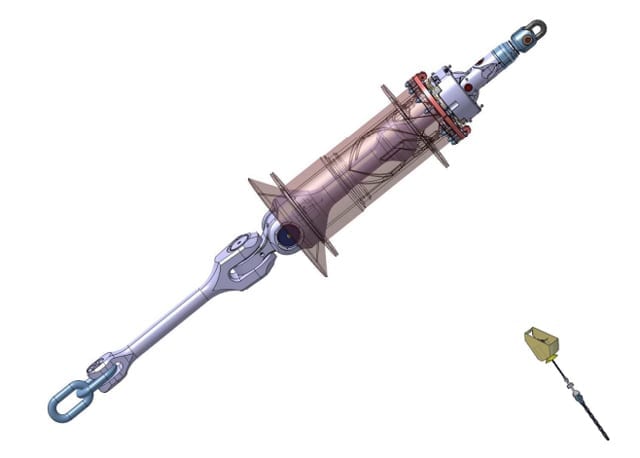SBM Offshore Wins Order for New Exxon Mobil FPSO
AMSTERDAM, July 3 (Reuters) – Dutch marine engineer SBM Offshore has won a contract to supply a new production vessel for oil major Exxon Mobil in Guyana, setting its shares...

Updated: May 6, 2015 (Originally published May 4, 2015)
Anchoring a floating production facility such as an FPSO in deep water is not a trivial thing to do by any means considering the vessel has to remain there firmly in position for upwards of 20 or more years.
Millions of repetitive wave forces, along with the inherently corrosive environment will challenge even the strongest parts of the mooring system.
On the lower position on the turret of an FPSO is an area called the chain table where the dozen or more anchor chains are secured.
Andrew Newport, Technology Director at SBM Offshore, notes that in the past, these anchor chains would be pulled into place at the chain deck and locked into a swivel system that allowed the chain to move with the motions of the vessel over its lifespan at the field.
Unfortunately, the bi-directional swivel, which is under a constant state of load – in the range of 200 tons or more – has to overcome a significant amount of static friction at the bearing surfaces before it will move with the motions of the vessel. So much static friction in fact, that the links of the chain would actually deform in some cases.
The next move was to attach pipes, sort of like huge hawse pipes to the swivel that would increase the lever arm of the chain in order to overcome the static friction of the swivel.
This idea worked, however it created significant issues when it came to bringing an FPSO shoreside for maintenance due to the added draft issues presented by the hawse pipes, or while in transit as each pipe had to be rigged for sea so that it wouldn’t bang around on the underside of the turret.
Additionally, as the contract durations for FPSOs have increased from an average of 14 years to now 20 years or more, new questions have come up surrounding the integrity of that particular swivel system over an extended period of time, says Newport.
For the past six years or so, engineers at SBM Offshore have been working on solving this issue and have come up with a solution that has won the “Spotlight on New Technology” award this year at the Offshore Technology Conference in Houston, Texas.
Newport says engineers at his company have patented theArticulated Rod Connecting Arm (ARCA) Chain Connector, pictured above which does away with a chain stopper concept and replaces it with a swivel locking system that provides a solid “leader” of sorts that provides a very strong and durable connection between the hull and the chain. In addition, this system allows the chain to be disconnected under 600 tons of load per locking device, or transfer up to 900 tons per locking device when connected.
This swiveling leader, putting it in fishing terms, gets pulled up inside the turret and in doing so, twists and locks into place. To release, tension must be taken back on the system which will allow it to be disengaged from the hull.
Sailors who have ever sailed a sailboat with halyard locks can think of this as a really strong halyard lock, but for chain.
SBM Offshore notes that due to the lack of a housing tube, there is no need to send divers to disengage the seafastening which significantly improves the safety of the connection and disconnection of mooring chains. In addition, the company says that as the articulations are removed from the turret chaintable, the turret diameter can potentially be reduced, allowing for optimization and cost savings.
“The technology will have a significant impact as it provides a solution to several industry concerns,” says Newport. “It allows the inspection and change-out of the articulations that form a key element of chain connectors. This feature becomes fundamental as design life of mooring systems increases above 20 years, with systems now being designed for lives of 40 and 50 years. In addition ensuring the good condition of the articulations is a necessary prerequisite to avoiding Out-of-Plane Bending (OPB) fatigue failure of the chain links.”
The ARCA has completed full scale prototype testing with 154 mm chain under 200 tonne pretension and is being offered to clients for future projects.

Sign up for gCaptain’s newsletter and never miss an update

Subscribe to gCaptain Daily and stay informed with the latest global maritime and offshore news
Essential news coupled with the finest maritime content sourced from across the globe.
Sign Up